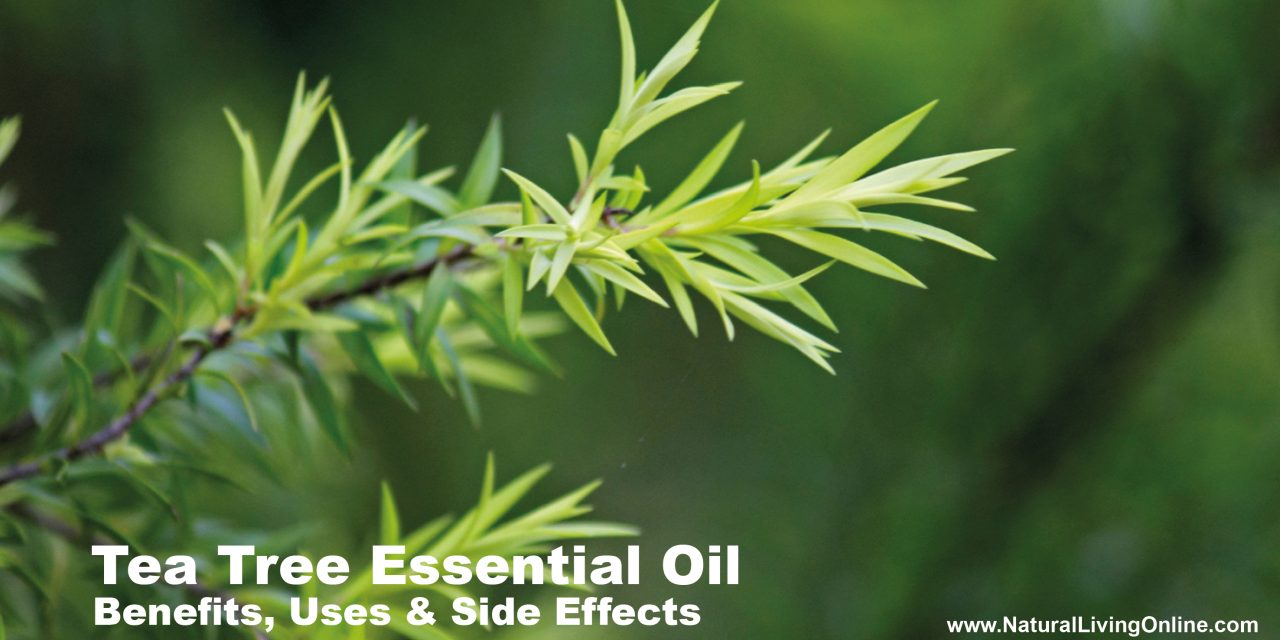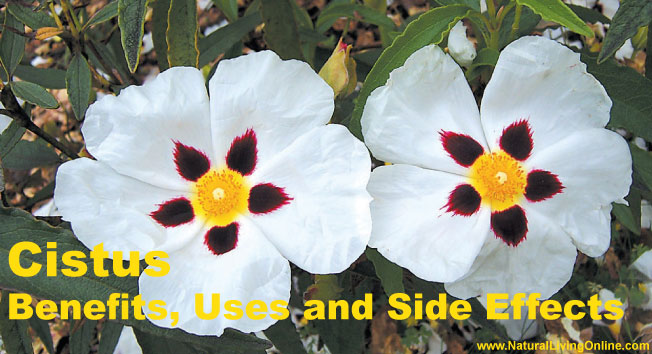Tea tree essential oil is a natural remedy derived from the leaves of the Australian tea tree. It has gained popularity for its potential health benefits, particularly in skin care and hair treatment. Tea tree oil is known for its antimicrobial properties, which can help treat various skin conditions such as acne, eczema, and psoriasis.
Additionally, tea tree oil is touted for its ability to reduce inflammation and promote healing. People often use it to treat minor cuts, burns, and insect bites. Its versatility makes it a valuable addition to any natural health enthusiast’s toolkit.
However, it’s important to be aware of the potential side effects of tea tree oil. While it is generally safe when used topically, it can cause skin irritation in some individuals. It’s also crucial to never ingest tea tree oil, as it can lead to serious health issues.
Key Takeaways
- Tea tree oil offers antimicrobial and anti-inflammatory benefits.
- It is useful for treating skin conditions and minor wounds.
- Ingesting tea tree oil is unsafe and can cause severe health problems.
Origins and Composition
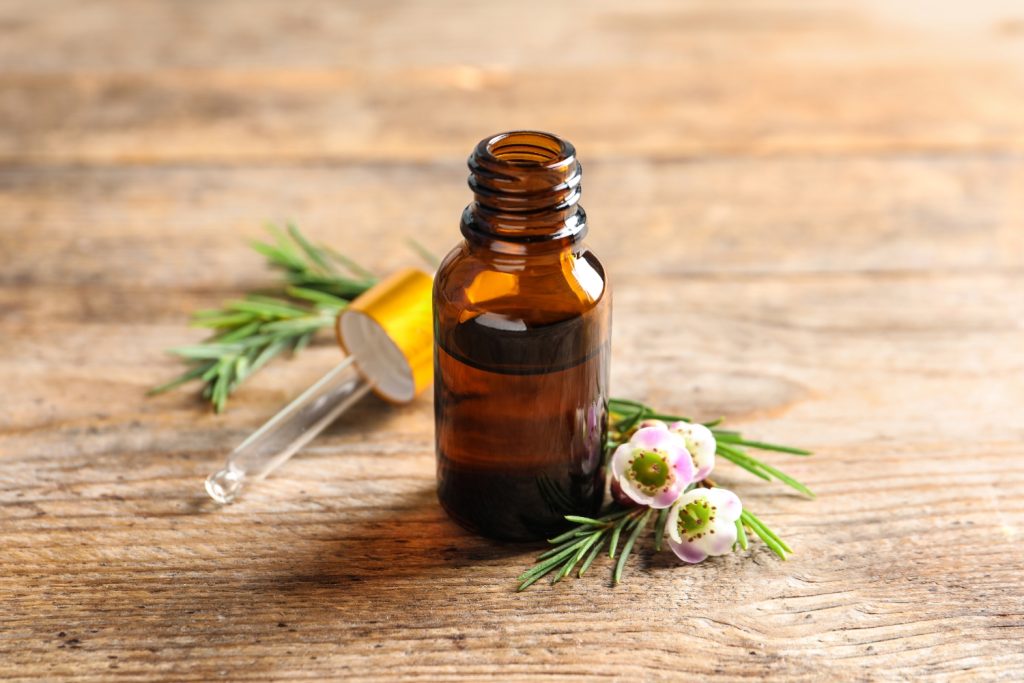
Tea tree oil, derived from the leaves of the Australian native tree Melaleuca alternifolia, has been used for centuries. It is valued for its powerful properties, primarily due to its unique chemical composition.
Source and History
Tea tree oil comes from the Melaleuca alternifolia, a tree native to Queensland and New South Wales, Australia. The Aboriginal people of Australia have long used tea tree leaves in their traditional medicine practices to treat wounds and infections.
In the 1920s, Australian chemist Arthur Penfold researched the oil’s antiseptic qualities, bringing it into mainstream use. Melaleuca leaves are steam-distilled to extract the essential oil, capturing its concentrated properties.
Tea tree oil contains over 100 different compounds. The primary active ingredient is Terpinen-4-ol, which is known for its antimicrobial and anti-inflammatory effects. Other important constituents are tepinene and cineole, which add to its potent therapeutic benefits.
Tea Tree Essential Oil Profile
Botanical Name: Melaleuca alternifolia
Family: Myrtaceae
Common Names: Tea tree oil, Melaleuca oil
Plant Description: Tea tree is an evergreen shrub or small tree native to Australia. It typically grows to about 2-5 meters (6-16 feet) tall. The plant has narrow, aromatic leaves and white, fluffy flowers. The leaves are the source of tea tree essential oil, which has been traditionally used by the indigenous Bundjalung people for its medicinal properties.
Oil Description: Tea tree essential oil is extracted from the leaves of the tea tree plant. The oil is clear to pale yellow with a fresh, medicinal, camphoraceous aroma. It is renowned for its potent antimicrobial properties.
Extraction Method: The oil is extracted through steam distillation of the fresh leaves and twigs. This method preserves the oil’s beneficial compounds and yields a high-quality essential oil.
Chemical Composition
Tea tree essential oil contains a variety of active compounds. The key components include:
- Terpinen-4-ol (30-48%)
- Gamma-terpinene (10-28%)
- Alpha-terpinene (5-13%)
- 1,8-Cineole (0-15%)
- Alpha-terpineol (3-8%)
- Terpinolene (1.5-5%)
- Alpha-pinene (1.5-4%)
Properties
- Antimicrobial: Effective against bacteria, fungi, and viruses.
- Anti-inflammatory: Reduces inflammation and soothes irritated skin.
- Antiseptic: Disinfects wounds and prevents infection.
- Antifungal: Treats fungal infections such as athlete’s foot and nail fungus.
- Antiviral: Helps combat viral infections.
- Analgesic: Provides pain relief.
- Decongestant: Clears respiratory congestion.
- Insecticidal: Repels insects and soothes insect bites.
Therapeutic Properties and Benefits
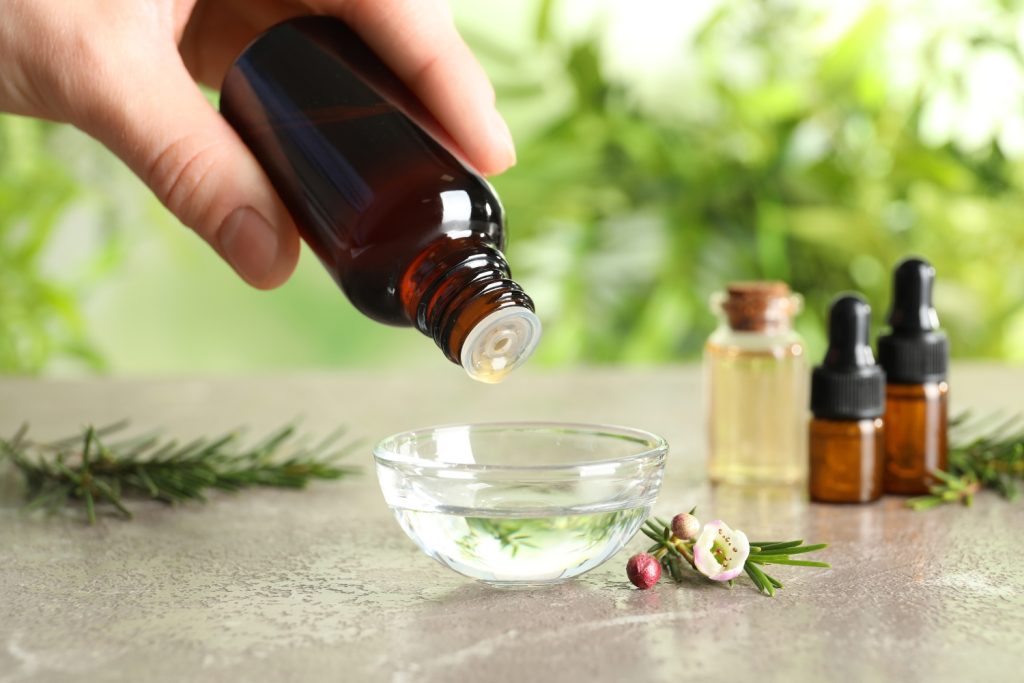
Tea tree essential oil offers notable advantages due to its antimicrobial effects, skin care benefits, and anti-inflammatory properties. These qualities make it a valuable addition to natural health and beauty routines.
Antimicrobial Effects
Tea tree oil is known for its strong antimicrobial effects. It contains compounds that can combat bacteria, fungi, and viruses. This makes it useful for treating minor cuts and scrapes by preventing infections. Additionally, it is effective against common pathogens such as Staphylococcus aureus and Escherichia coli.
These antimicrobial properties also aid in fighting common fungal infections like athlete’s foot and nail fungus. By reducing bacteria and fungi, tea tree oil can also help manage unpleasant odors and keep the skin healthy.
Skin Care Advantages
In skin care, tea tree oil is widely recognized for its acne-fighting abilities. It can reduce acne lesions and control the bacteria that cause breakouts. Tea tree oil helps diminish redness and swelling, making the skin appear clearer and healthier.
Tea tree oil can also benefit those with conditions like psoriasis and eczema by soothing inflammation and irritation. When mixed with carrier oils like coconut or lavender oil, it can be applied as a natural lotion to improve skin texture and appearance.
Anti-Inflammatory Action
The anti-inflammatory action of tea tree oil makes it effective in reducing inflammation. It contains antioxidants that neutralize free radicals, preventing cellular damage. This can help soothe skin irritation, reduce swelling, and promote healing in injured or inflamed areas.
Using tea tree oil for inflammation can also be beneficial for conditions like contact dermatitis or insect bites. Its ability to calm the skin and reduce discomfort makes it a valued component in therapeutic treatments.
Common Uses and Applications
Tea tree essential oil is popular for its medical uses and household applications. It can treat skin problems, boost hair health, and work as a natural cleaner.
Medical Applications
Tea tree oil has many medical applications. One of the most popular uses is as an acne treatment. Its antibacterial properties help reduce acne-causing bacteria on the skin. It can be found in various skin care products like creams and cleansers.
To treat dandruff, tea tree oil can be added to shampoos. It helps reduce flaking and itching by addressing the fungal infection that often causes dandruff. Some people also use it to manage dermatitis with similar results.
Tea tree oil can be applied as an antiseptic for minor cuts and scrapes. Diluting it with a carrier oil like coconut oil or an over-the-counter cream can help prevent infection and promote quicker healing.
Household Uses
In the household, tea tree oil proves to be a versatile product. Its antiseptic qualities make it useful as a natural cleaner. When diluted with water, it can be used to wipe down surfaces and kill germs, making it a handy alternative to chemical cleaners.
It’s also used in homemade mouthwash solutions. A few drops of tea tree oil can be mixed with warm water to help reduce bacteria and bad breath, but it should never be swallowed.
Some people use tea tree oil as a natural air freshener. Adding a few drops to a diffuser can help purify the air and eliminate odors. In this way, tea tree oil offers multiple advantages both for health and cleanliness at home.
Risks and Side Effects
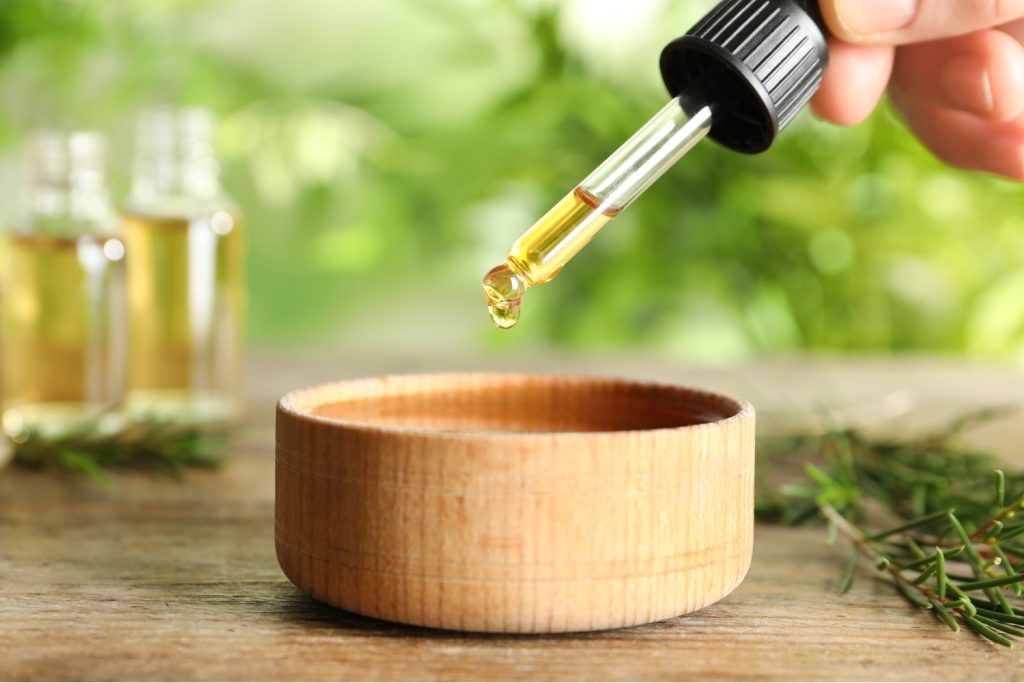
Tea tree oil has several benefits, but it is important to understand the potential risks. Applying it improperly or using it in high concentrations can lead to skin problems and systemic toxicity.
Potential Skin Reactions
Using tea tree oil on the skin can lead to side effects like irritation and allergic reactions. Contact dermatitis is a common issue, where the skin becomes red, itchy, and inflamed. This often happens when the oil is used undiluted or in high concentrations. Symptoms can include a rash, burning, and itchiness.
People with sensitive skin or allergies should be particularly cautious. Diluting the oil with a carrier oil can help minimize these issues. It’s advisable to perform a patch test before full application to check for any skin irritation or allergic reaction.
Tea tree oil should not be used on broken skin or large areas of the body. Even when diluted, it can still cause problems for those with sensitive skin. The FDA does not heavily regulate essential oils, so consumers should be careful about product quality and concentration levels.
Systemic Toxicity
Ingesting tea tree oil is highly dangerous and can lead to serious health issues. Systemic toxicity may include symptoms like confusion, ataxia, and even coma. Tea tree oil is toxic if swallowed, with risks severe enough to lead to hospitalization. Children are particularly at risk if they accidentally ingest it.
Using the oil near the mouth or lips might also carry risks because accidental ingestion can occur. Always store tea tree oil out of reach of children to prevent accidental ingestion.
Even when applied topically, if used in excessive amounts, it can be absorbed through the skin and cause systemic side effects. Gynecomastia (breast growth) in prepubertal boys has been linked to excessive use of tea tree oil. Always follow safety guidelines to avoid systemic toxicity.
Guidelines for Use
Tea tree oil can be a powerful natural remedy when used correctly. Follow these guidelines to ensure safe and effective usage.
Dilution and Application
Tea tree oil should always be diluted before use. Using it undiluted can cause irritation or allergic reactions. Typically, add a few drops of tea tree oil to a carrier oil, such as coconut or olive oil. A common ratio is one teaspoon of carrier oil to five drops of tea tree oil.
Before applying tea tree oil to larger areas of the skin, a patch test is crucial. Apply the diluted mixture to a small area of skin and wait 24 hours. If there is no reaction, it is safe to use.
Tea tree oil can be applied topically to treat issues like acne, nail fungus, or insect bites. Consistent use might be necessary to see results. Avoid using it close to eyes, as it can cause irritation.
Precautions and Interactions
When using tea tree oil, be aware of potential interactions and reactions. It should not be ingested, as it can cause serious side effects like confusion and inability to walk, according to WebMD.
Allergic reactions can occur, especially in people allergic to plants like eucalyptus. Discontinue use if you experience redness, rash, or itching. Pregnant and breastfeeding women should consult a healthcare provider before using tea tree oil, as its effects in these groups are not well-studied.
Always store tea tree oil in a cool, dark place to preserve its properties. Be cautious of mixing it with other essential oils or medications that could interact poorly.
Frequently Asked Questions
What are the benefits of using tea tree oil on the face?
Tea tree oil can help treat acne due to its antibacterial properties. It reduces redness, swelling, and inflammation, and can improve the appearance of acne-prone skin by killing Cutibacterium acnes bacteria.
How can tea tree essential oil be used in a diffuser and what are its benefits?
Tea tree oil can be used in a diffuser to purify the air. This method helps reduce airborne bacteria and fungi. Inhaling the scent may offer aromatherapy benefits, such as easing congestion and potentially boosting the immune system.
Are there any side effects associated with the use of tea tree oil on the skin?
Some people may experience skin irritation or allergic reactions when using tea tree oil. It’s important to do a patch test before applying it more broadly. If irritation occurs, discontinue use immediately.
What are the recommended uses of tea tree oil for hair care?
Tea tree oil can improve scalp health, reduce dandruff, and promote hair growth. Mixing a few drops with a carrier oil and massaging it into the scalp can alleviate dryness and itching, making hair look healthier and shinier.
How should tea tree oil be safely applied to the body?
You should always dilute tea tree oil with a carrier oil, such as coconut or olive oil, before applying it to the skin. This helps prevent irritation. For wounds or infections, apply the diluted mixture directly to the affected area using a clean cotton ball.
What precautions should be taken when using tea tree oil due to its impact on estrogen levels?
Tea tree oil may affect hormone levels if used in high concentrations. Using it in high concentrations can potentially cause hormonal imbalances. It is recommended to consult a healthcare provider before using it extensively to avoid any adverse effects.
References:
Melaleuca alternifolia (Tea Tree) Oil: a Review of Antimicrobial and Other Medicinal Properties
The extraction and benefits of tea tree oil
This website does not provide medical advice.
All information provided on this website, and on associated social media networks, including but not limited to texts, images, and numbers are for general information purpose only. It is not intended as medical advice and it does not include all possible precautions, side effects, or interactions that may occur. Neither NaturalLivingOnline.com nor its author/founder take responsibility for how you use this information. Statements contained on NaturalLivingOnline.com have not been evaluated by the FDA. You should conduct thorough research via multiple sources and consult your physician or qualified doctor before using any essential oil or herbal remedy. Information on NaturalLivingOnline.com must not be relied upon for medical, legal, financial or other decisions.

